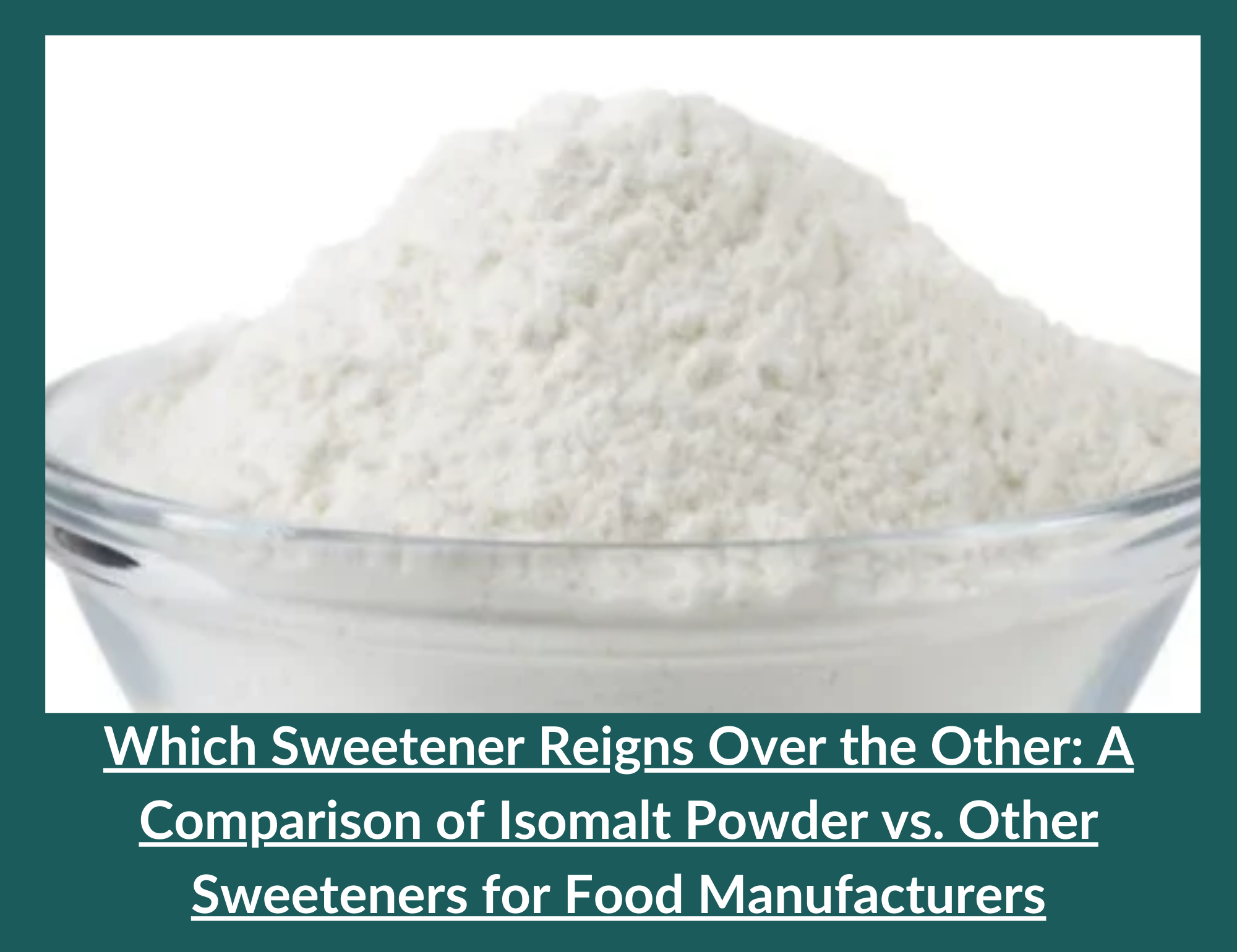Artificial sweeteners are used as sugar substitutes in various food and beverage products. They offer low or no calories, making them an attractive option for individuals looking to reduce their sugar intake. Isomalt powder is an artificial sweetener that has recently gained popularity.
This article compares Isomalt powder with other artificial sweeteners regarding their nutritional properties and functionality.
What is Isomalt Powder?
Isomalt is a sugar alcohol that is derived from beet sugar. It is a low-calorie sweetener with a sweetness level of about 50% of sugar. Isomalt powder is often used as a sugar substitute in food and beverage products and pharmaceuticals. It has a similar texture to sugar and can be used to make hard candies, caramels, and other sweet treats.
Nutritional Properties of Isomalt Powder
Isomalt powder is a low-calorie sweetener that provides about two calories per gram. It has a glycemic index (GI) of 2, significantly lower than sugar (GI of 65). The lower glycemic index makes it a suitable sweetener for people with diabetes, as it has a minimal effect on blood sugar levels. Additionally, Isomalt powder is tooth-friendly and does not promote tooth decay, making it a healthier alternative to sugar.
The Functionality of Isomalt Powder
Isomalt powder has various functional properties, making it a popular choice in the food industry. It has a similar texture to sugar and can be used to make hard candies, caramels, and other sweet treats. Its high melting point makes it ideal for use in baked goods and chocolate products. Isomalt powder can also be used as a bulking agent in food products, adding texture and volume without adding calories.
Comparison with Other Artificial Sweeteners
While Isomalt powder has several benefits, comparing it with other artificial sweeteners is important to understand its unique properties. Below is a comparison between Isomalt powder and other commonly used sweeteners, including sugar.
Isomalt V/s Sugar:
Isomalt and sugar are sweeteners but differ in calorie content and dental health impact. Isomalt is lower calorie and does not promote tooth decay. This comparison table aids in better understanding the differences.

Isomalt v/s Erythritol:
Isomalt and Erythritol are sugar substitutes similar in being low-calorie and tooth-friendly. Isomalt is partially absorbed, while erythritol is non-caloric. Here is a table of comparison for both sweeteners:

Isomalt v/s Stevia:
Isomalt and stevia are both popular sugar substitutes with unique characteristics. Isomalt is a low-calorie, partially absorbed sweetener, while stevia is a zero-calorie, intensely sweet herb. For your convenience, here is a comparison table:

Isomalt v/s Sucralose:
Isomalt and sucralose are sugar substitutes but differ in sweetness level and absorption. Isomalt is partially absorbed, while sucralose is non-caloric. Here’s a comparison table for both sweeteners:

Isomalt powder is a low-calorie artificial sweetener with several nutritional and functional benefits. It is a tooth-friendly alternative to sugar with a low GI, making it suitable for people with diabetes.
Isomalt powder has various functional properties that make it a popular choice in the food industry, such as its high melting point and bulking properties. While it has some unique properties, comparing it with other artificial sweeteners is important to understand its place in the market.
Ready to sweeten your food products with Isomalt? Simplify your procurement with EasyBuy and secure the best deals.
With EasyBuy, you can trust our reliable sourcing process, designed to meet the needs of food ingredient manufacturers.Say goodbye to procurement challenges and hello to the seamless purchasing of Isomalt – the ultimate solution for your sweetening needs!
Shop now and elevate your food ingredient sourcing experience!
Citations:
- Serra AT, Matias AA, Alves PM, et al. Evaluation of the cytotoxicity and genotoxicity of isomalt, a sugar substitute. Food Chem Toxicol. 2012;50(10):3900-3907.
- Alminger M, Eklund-Jonsson C. Whole-grain cereal products based on a high-fibre barley or oat genotype lower post-prandial glucose and insulin responses in healthy humans. Eur J Nutr. 2008;47(6):294-300. doi: 10.1007/s00394-008-0733-1.
- Serra AT, Matias AA, Alves PM, et al. Evaluation of the cytotoxicity and genotoxicity of isomalt, a sugar substitute. Food Chem Toxicol. 2012;50(10):3900-3907. doi: 10.1016/j.fct.2012.07.029.








